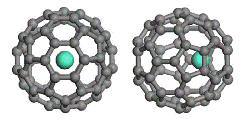Chemistry, Department of: Faculty Series

Xiao Cheng Zeng Publications
Document Type
Article
Date of this Version
2015
Citation
Chem. Commun., 2015, 51, 3185--3188
Abstract
This study is motivated by the recent discovery of the first all-boron fullerene analogue, a B40 cluster with D2d point-group symmetry, dubbed borospherene (Nat. Chem., 2014, 6, 727). Insight into the electronic structures and spectral properties of B40 is timely and important to understand the borospherene and the transition from open-ended plate or ribbon-like structures to a hollow-cage structure at B40. Optimized geometries of borospherene B40 for both the ground state and the first excited state allow us to compute spectral properties including UV-vis absorption, infrared (IR) and Raman spectra. Highly resolved absorption and emission spectra are obtained, for the first time, for the fullerene at the time-dependent density-functional theory (TD-DFT) level within the Franck–Condon approximation and including the Herzberg–Teller effect. Assigned vibrational modes in absorption and emission spectra are readily compared with future spectroscopy measurements to distinguish the hollow-cage structure of D2d-B40 from other quasi planar boron structures.


Comments
Used by permission